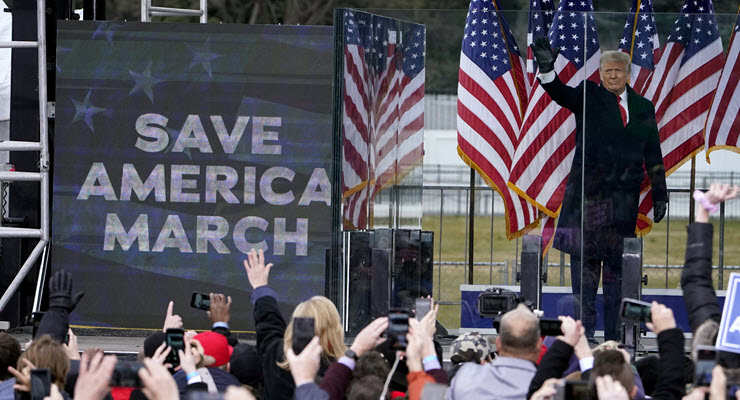
In Both Sides Now, author and ethicist Leslie Cannold presents two sides of an argument, and then it’s over to you: what do you think is true, and what do you think Cannold really believes?
Today: Following the Capitol Hill siege on January 6, US President Donald Trump was suspended then permanently banned from Twitter. He has since had his accounts on other platforms removed too. Has he been unfairly censored?
In favour
Censorship is the suppression of speech, public communication, or other information deemed by governments, private institutions, or other controlling bodies as subversive of the public good. In the wake of the US president’s fomenting of violent insurrection at the nation’s capital last week, mainstream media platforms including Twitter, Facebook, Reddit, Twitch and Google disabled his accounts. When his supporters migrated to less policed platforms like Parler, corporate giants Amazon, Apple and Google used their combined market power to hobble that platform, too.
If that isn’t censorship, I don’t know what is.
But while western citizens tend to view the C-word negatively, the truth is that all rights come with important limitations — and the guarantee of free speech is no different.
Even in the US, where the constitution permits fewer limits than in democracies in Europe and Australia, there are categories of speech that are not protected. These include child pornography, speech that incites violence or suicide, is obscene, based on false statements of fact, is commercial in nature, constitutes the theft of another’s intellectual property rights, or is necessary to achieve a compelling government interest.
Given yesterday’s overwhelming and bipartisan vote in the House yesterday to impeach the president for “inciting violence against the government of the United States”, the growing number of arrests and charges for violent crimes including forced entry and assault, plus the continued risk of violence in the lead-up to Joe Biden’s inauguration on January 20, the threshold for restricting the current occupant of the White House’s speech — at least for now — has unquestionably been reached.
So why all the de-platforming kerfuffle? Especially given that the president — unlike most other citizens — need not rely on social media channels to be heard. All he need do is step to the podium in the press briefing room, tap the resources of the White House press office, or use loyal networks like Fox News, OAN, and Newsmax to get his message out.
The answer is that despite all the power and responsibility social media platforms possess to moderate content on their sites, they’ve been loath to use it until recently, especially against a “newsworthy” contributor like Trump, which is why an environment of impunity, entitlement, and mob mentality has reigned.
Only when the connection between Trump’s false, hateful and dangerous speech and the violence playing out on our TV screens became undeniable, was the line in the sand finally — and fairly — enforced.
Against
Censoring Trump is unfair. It’s also unwise.
Sure, it would have felt good to those who have spent the last four years slack-jawed at the lack of accountability for the 45th president’s harassment, incitement, and lies to see him finally get his comeuppance. But narrowing freedom on the internet to make an example of Trump will backfire and, as history shows, it will be the powerless, and US democracy itself, that will suffer most in the end.
US courts have long held that the proper response to negative speech is not “enforced silence” but “more speech”. That’s what the internet gives us: more voices and a greater diversity of ideas.
But the gifting of a bully pulpit to anyone who wants it, and the expansion of the horizonal access we have to one another without gatekeepers, has a price: one that’s personified by Donald Trump. Namely, that grifters, harrassers, liars, and criminals can roam the public square without constraint, too. No point whinging about it. That’s just the cost of doing business.
Countering such deplorables requires the same solutions that have worked since the democratic experiment began. These include defamation law as well as education, now known as digital literacy, to help media consumers verify facts, recognise fake news and push back against it.
Anything more muscular will be turned back on to the very users it was meant to protect. Noam Chomsky and 154 co-signatories of an open letter in Harper’s Magazine put it this way: “The restriction of debate, whether by a repressive government or an intolerant society, invariably hurts those who lack power and makes everyone less capable of democratic participation. The way to defeat bad ideas is by exposure, argument, and persuasion, not by trying to silence or wish them away.”
Which side do you think Cannold sits on? And what do you believe? Send your thoughts to letters@crikey.com.au with Both Sides Now in the subject line.








The Murdoch press refuse to print my letters or publish my press releases. Is this censorship? In an election campaign ALL mainstream media publish much more of the old parties’ pressers. Small parties and independents have to do much more, like crazy stunts, to get their platforms or policies published. How is this not ‘censorship’ according to your definition? In my view Trump was NOT censored….he still had the right to publish his statements on line via a website, by printing on paper and letterboxing, by taking out paid advertisements on tv, by making placards and buying a loud hailer and marching down the street. Why is it that the rich and powerful cry such crocodile tears when the same refusal to publish applied to the insignificant and poor citizens is applied to them? If we are going to make Twitter or Facebook publish stuff they don’t like, we’ll let’s apply that same approach to the established media like Murdoch, Fairfax etc., and require them to publish stuff they don’t like.
Having one’s letters rejected by a legal entity is not an act of censorship Mark. They are exercising their choice as much as you are exercising your choice. They, at law, have no obligation to anyone to make them feel “good” or whatever. I’m happy to discuss further.
That’s exactly my point. Twitter and f/b are just exercising their right to reject material, be it from Trump or anyone. But further the Libs are floating the idea to make some outlets, but not all, by changing the law, to lose that legal right.
The real issue is that the censorship discussion has been peddled by the new fascists (National party and others) to distract from our current government and Morrison’s tepid response to the attempted coup in the USA.
… and Morrison’s apparent stuff-up of vaccine acquisition, while the public clamour for Pfizer jabs and remote federal quarantine grows.
On the substance of your posts, I agree entirely. ‘Freedom of speech’ is humbug whenever raised by conservatives and right wing loons, who only want to preserve it for themselves, obligation-free. Take Craig Kelly, for example, who’s been whining hypocritically about Trump’s exclusion from ‘social media’; it’s emerged that he’s been refusing access to his website or Facebook, or whatever, to people who express disagreement with his lies and dangerous nonsense.
Craig Kelly and Christianson by the lies they tell are a danger to the community of those susceptible to conspiracy and ignorant of scientifically proven health treatments. Because of their power to influence they are not all that dissimilar from those who promote their unproven products for weight loss or cancer treatment. They also use public funds for their media promotion
Erasmus, you are happy to discuss “further” but you have left the field. Self censorship?
Please explain.
Trump was proven a danger in the Society with his incitement of insurrection. He could not be removed from office because the Republicans would not take a stand. The reduction in the spread of his megaphone has at least minimised the threat to the nation. These media companies have acted responsibly on this occasion
Frankly Kris, uncle Joe has begun better than I anticipated but it is very early days. His remarks to date are not strictly official. As to any “improvement” I have my reservations but we will see before too long.
Overall, an article at a good standard Leslie. It ought to be added that your last sentence is entirely within the empiricist tradition (as I suspect that you are aware). In fact, Voltaire said (more or less) the same thing.
As an afterthought, perhaps you might get around to jotting something for Cky regarding the effects of post moderation-ism and its contribution to the state of confusion regarding such topics.
That was a good article.
Other than that, this is the most tedious and disingenuous media debate I have seen for ages, in a very competitive field. Clearly the LNP & Co. are fine with blatant lying and hypocrisy. They’re genuinely annoyed at some loss of platforms to distribute their lies, but mostly just happy for another chance to wave a red flag at the left and create divisive internecine arguments. Oh and spit out more column inches to incite the followers and justify bloated fees. Job done.
Sure there are real concerns with access to communication for everyone and this has some negative side-effects, but all you can do in life is find compromises and get on with the important things. Honestly, the rogue pigeon debate on twitter is more engaging than much of the “free speech” nonsense. Talk about a dead cat on the table issue!
Censored, curated or edited? One thing we’re seeing, I think, is the importance of editorial (in both directions). Being able to choose editors, or not. Is editing by machine ever going to be good enough?
The problem with Chomsky et-al’s position is that we’ve reached the point in history where our eyeballs and ears have no room for “more speech”: they’re already full of it. Companies, politicians, our families are all actively fighting for our attention, and there are only so many hours in the day. The only question now is which speech.
The users of Facebook and Twitter are happy for that decision to be made for them, by a machine. The users of Nine and News (and the ABC) are happy for the decision to be made by the editors and curators of those channels. Others have other strategies (there are other strategies: self-curated RSS feeds and email is my own preference–it has its downsides too).
The unedited version, the firehose of all (public) speech is too much for any one person.